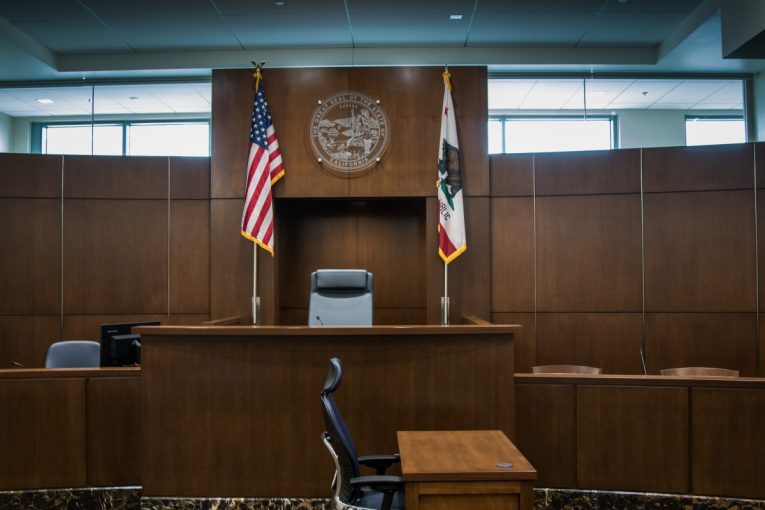
 Compiled by Savannah Dewberry
Compiled by Savannah Dewberry
The Vanguard is an online news group that provides in-depth coverage of courts in California and around the nation. Since 2006, The Vanguard has been dedicated to transparency, democracy, open government and social justice. The team of 40 to 50 interns monitors live court proceedings in more than six different counties throughout California, from the Greater San Francisco Bay Area all the way through the Central Valley and towards Southern California.
This week interns were covering the courts in Sacramento and Yolo, as well as the hearings over San Quentin State Prison’s handling of a COVID-19 outbreak in 2020 that resulted in 29 deaths. Our coverage of the San Quentin trial was featured on the San Francisco Public Defender’s office’s website.
These are some highlights of this week’s coverage.
Yolo County Superior Court
 Reporter Kathryn Wood: (Yolo 8) On May 24, Wood witnessed a number of continuances, plea agreements, and probation hearings in Yolo County. In court, the attorneys discussed the conditions that inmates were burdened with in jail during COVID-19. One defendant mentioned that he “asked for certain mental health care and medical care” and believes he has not received any adequate care.
Reporter Kathryn Wood: (Yolo 8) On May 24, Wood witnessed a number of continuances, plea agreements, and probation hearings in Yolo County. In court, the attorneys discussed the conditions that inmates were burdened with in jail during COVID-19. One defendant mentioned that he “asked for certain mental health care and medical care” and believes he has not received any adequate care.

Reporter Alexander Ramirez: (Yolo 1), on May 28, There was a man who came in who had a case thatinvolved the possession of methamphetamines a long time ago. Since he came to court for his charges years ago, he not only stopped using drugs, but also became a part of a community group that the judge was familiar with. Ramirez believes it was this familiarity that caused the judge to get a bit personal with the man and congratulate him on his progress with his addiction. It was a wholesome end to a case.
Sacramento County Superior Court


For the next ten minutes, Mann repeatedly stated that he did not understand why he was present in court, that he was innocent, and that the court was trying to manipulate him into confessing for a crime he did not commit.
After this long series of outbursts, Public Defender Sameera Ali was able to calm down Mann enough for the preliminary hearing to continue. Two officers who were called to the scene of the crime were called to testify, and they reiterated statements made by several witnesses about the alleged stabbing to the victim.


However, regardless of these testimonies, Judge Lewis found that there was sufficient evidence to find Mann guilty on both felony counts, and for a holding order to be issued. Mann let out another outburst when the initial plea deal was brought up between the prosecution and Judge Lewis, claiming that he would have rather accepted it than move forward with a trial.
However, since the preliminary hearing had already been conducted, DDA Rainey Jacobson relayed to Mann that she would ask her supervisor if the plea deal could be extended. A date for a resolution hearing was then scheduled for June 9.


The rifle, however, was discovered in another man’s room. DDA Jordan Avery called Officer Cunningham, the arresting officer, as a witness who revealed that he knew to conduct the search because he had been monitoring the defendant on social media.
According to the officer, the defendant had made multiple social media posts with the assault rifle. When the officer arrived on scene, he claimed the defendant moved away from him, towards the bedroom in which the assault rifle was found. As highlighted by Public Defender Damien Jovel, however, the door to that room was locked when the police moved to search it, and nothing illegal was found in the defendant’s room.
Judge Alyson Lewis was seemingly agitated by some of PD Jovel’s questions, shutting him down towards the end of his questioning. PD Jovel also motioned to have the charge reduced from a felony to a misdemeanor, arguing that the defendant had never been charged with a felony in the past. Judge Lewis, however, denied the motion and the defendant’s trial was set for August 30, 2021.
On May 28, in Sacramento 9, Bareini saw defendant Tina Bale’s preliminary hearing rescheduled to early August after deciding that she wanted to fire her privately hired lawyer, Nolan Del Campo, and represent herself. Bale wanted to remove Del Campo because, she claimed, he was being paid by the father of a man she has a restraining order against. Del Campo also wanted to remove himself from her case, citing irreconcilable differences and health issues.
Judge Helena R Gweon warned Bale about the dangers of representing herself, explicitly stating it was a bad idea and even offering to appoint her an attorney. Despite this, Bale decided to represent herself, with Judge Gweon’s permission, and is set to have a preliminary hearing in early August.
Marin County Superior Court


CDCR adapted CDC guidelines regarding Covid/distancing/etc to better fit their facilities, and officials also prepared a handout, in response to inmate concerns, to assure inmates that their health with regard to Covid was always being considered.
Guy Vandenberg, a nurse at San Quentin during the summer, testified next and reported that after identifying an inmate with onset Covid symptoms, he was unable to find anyone who knew what to do next. During the evening when the on-site physicians had gone home, neither the physician on call nor the senior registered nurse knew what to do regarding moving the patient. He also stated that the doctor said she had never been to the prison facility.
Alison Pachynski, the chief medical executive for San Quentin, was the last witness to testify. She stated that the ventilation looked different between H Unit and the cell block, and that H Unit, which consists of dorm-style housing, had been depopulated to address the virus situation. She also stated that the time between an inmate testing for Covid-19 and receiving their result could take up to a week and a half.
It typically took five to six days for a physician to receive the results, which were then mailed to the inmate via the prison mail system, adding a further 2-3 days to the process. Surveillance testing was utilized in the summer, and during April 2020, an offer to receive rapid testing from a researcher at UC Berkeley was turned down.
Reporter Christopher Datu: On May 24, during the afternoon session of the San Quentin Covid-19 trial, three witnesses were called. The first witness was Doctor Alison Pachynski, the Chief Medical Executive for San Quentin State Prison. Kristin Hucek questioned for the petitioners, developing the conditions proceeding the transfer of prisoners from the California Institution for Men in Chino, California.
Hucek’s questioning included a recommendation memorandum from Amend members, a group at UCSF aimed at transforming correctional culture to reduce health debilitating effects. Hucek needled Pachynski about how she dealt with the recommendations in the Amend memorandum and made it clear they were not heeded.
Pachynski was also asked to outline the COVID-19 protocols at San Quentin for the inmates and staff alike. Denise Yates conducted the cross examination that also delved into the protocol for San Quentin staff, particularly singling out the Nursing Department’s large responsibility and primary role in handling COVID-19 cases and precautions.
The second witness was Doctor David Sears, one of the Amend members who composed the recommendation memorandum. Sarah Salomon was another representative for the petitioners, bringing out Doctor David Sears as the second witness. Dr. Sears was one of the Amend members who toured the San Quentin facility and composed the recommendation report.
Salomon asked Dr. Sears to recall the conditions of the various housing blocks that gave what he described as a “sense of foreboding” for the inmates, staff, and local communities.
The third witness was Kevin Sample, an inmate at San Quentin who was present during the initial COVID-19 outbreak. Matthew Siroka conducted the questioning for the people, capturing the progression of the outbreak in San Quentin for Sample’s perspective and the effect that had on the inmates. The cross-examination by John Walters aimed at questioning the truthfulness of Samples’ testimony.




McGee immediately responded saying no, he did not feel this way. Walters continued to say that most prisoners see their cell as their home, which McGee 

Warden of San Quentin, Ron Broomfield, was also questioned by both sides about his knowledge of the transfer between the prisons and the policies set in the prison concerning COVID-19. Two different reports were referenced by the petitioner’s attorney that called for policy changed by the prison, the warden stated that the changes brought up in both were not implemented in San Quentin.
Reporter Alexander Ramirez: On May 26, the warden of the San Quentin facility was being questioned by Khari Tillary, The 


The facility is moving towards phase 3 of their plan, which involves more distancing and what is to be the “new normal” as he called it. He went on to say that in hindsight, lowering the population may have been the right choice, but also that in densely populated areas, an outbreak during a pandemic is more susceptible to happen.
After the warden was excused, another prosecution attorney brought a doctor’s testimony. The doctor was versed in the field of epistemology in relation to how it affects populations. She continued to mention the multiple times that she visited the San Quentin facility in October and April of last year.
Some staff were using surgical masks, inmates were reduced to cloth masks, and basically no social distancing was possible. Even if it was early in the pandemic, many recommendations and guidelines were already made available by previous outbreaks of influenza. This all led to her saying that the facility was inept and inadequate in their response to the pandemic.
Afterwards, her cross-examination started. The defense aimed to question her credibility to make educated opinions for prison systems and vaccines as an epidemiologist, but time was already winding down the matter is to be continued next week.


To sign up for our new newsletter – Everyday Injustice – https://tinyurl.com/yyultcf9
Support our work – to become a sustaining at $5 – $10- $25 per month hit the link: